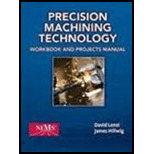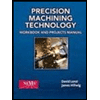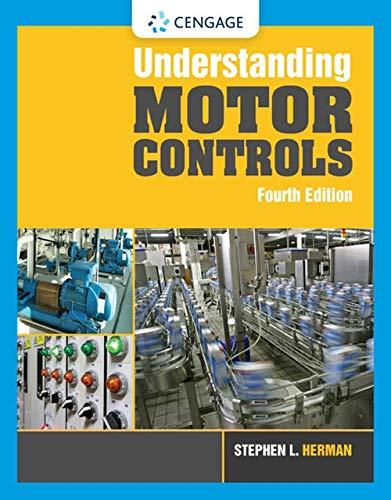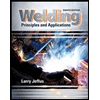
Precision Machining Technology (MindTap Course List)
2nd Edition
ISBN: 9781285444543
Author: Peter J. Hoffman, Eric S. Hopewell, Brian Janes
Publisher: Cengage Learning
expand_more
expand_more
format_list_bulleted
Concept explainers
Question
Chapter 3.2, Problem 11RQ
To determine
The tool that can be used as a reference plane while performing layout.
Expert Solution & Answer
Trending nowThis is a popular solution!

Students have asked these similar questions
For some viscoelastic polymers that are subjected to stress relaxation tests, the stress decays with
time according to
a(t) = a(0) exp(-4)
(15.10)
where σ(t) and o(0) represent the time-dependent and initial (i.e., time = 0) stresses, respectively, and t and T denote
elapsed time and the relaxation time, respectively; T is a time-independent constant characteristic of the material. A
specimen of a viscoelastic polymer whose stress relaxation obeys Equation 15.10 was suddenly pulled in tension to
a measured strain of 0.5; the stress necessary to maintain this constant strain was measured as a function of time.
Determine E (10) for this material if the initial stress level was 3.5 MPa (500 psi), which dropped to 0.5 MPa (70
psi) after 30 s.
For the flows in Examples 11.1 and 11.2, calculate the magnitudes of the Δ V2 / 2 terms omitted in B.E., and compare these with the magnitude of the ℱ terms.
Calculate ℛP.M. in Example 11.2.
Chapter 3 Solutions
Precision Machining Technology (MindTap Course List)
Ch. 3.1 - Information such as tolerances and scale can be...Ch. 3.1 - What view of a drawing usually shows the most...Ch. 3.1 - Prob. 3RQCh. 3.1 - The line type used to show edges of an object that...Ch. 3.1 - What line type is used to show edges of an object...Ch. 3.1 - What two line types work together to show sizes on...Ch. 3.1 - Identify the line types labeled in the print...Ch. 3.1 - Define and briefly describe the following...Ch. 3.1 - A dimension listed on an engineering drawing is...Ch. 3.1 - List and briefly describe the three types of...
Ch. 3.1 - Briefly describe the difference between a...Ch. 3.1 - The relationship between sizes of mating parts is...Ch. 3.1 - What does GDT stand for?Ch. 3.1 - A plane used as a reference for dimensions is...Ch. 3.1 - A GDT symbol and the amount of tolerance are shown...Ch. 3.1 - What are the five categories of symbols used in...Ch. 3.1 - Briefly explain the benefit of a position...Ch. 3.2 - Prob. 1RQCh. 3.2 - What is the purpose of layout fluid (dye)?Ch. 3.2 - Prob. 3RQCh. 3.2 - Briefly define a scriber and its use.Ch. 3.2 - What two angles can be laid out with the...Ch. 3.2 - What two tasks can a divider be used to perform?Ch. 3.2 - What safety precautions should be observed when...Ch. 3.2 - What would the divider setting be to scribe a...Ch. 3.2 - What would the divider setting be to scribe an arc...Ch. 3.2 - Prob. 10RQCh. 3.2 - Prob. 11RQCh. 3.2 - Briefly describe the use of a surface gage.Ch. 3.3 - What are three safety rules to observe when using...Ch. 3.3 - List three types of screwdriver tips.Ch. 3.3 - What is the advantage of using slip joint pliers?Ch. 3.3 - What is an advantage of using locking pliers?Ch. 3.3 - What are two uses for a ball peen hammer?Ch. 3.3 - What is the advantage of a soft face hammer?Ch. 3.3 - In what situation would a box-end wrench be chosen...Ch. 3.3 - List two precautions to observe when using...Ch. 3.3 - What is one method of preventing damage to work...Ch. 3.3 - List three safety precautions to be observed when...Ch. 3.3 - In which direction should hacksaw blade teeth...Ch. 3.3 - List two safety precautions that should be...Ch. 3.3 - Will a single-cut or a double-cut file remove...Ch. 3.3 - Will a single-cut or a double-cut file produce a...Ch. 3.3 - ___________ and _________ are two common filing...Ch. 3.3 - What tool is used to clean a file?Ch. 3.3 - What are the two forms of abrasives used in...Ch. 3.4 - Sawing machines can be divided into roughly four...Ch. 3.4 - The vertical band saw is particularly useful, as...Ch. 3.4 - The horizontal band saw is ideal for cutting...Ch. 3.4 - Cutting action on the power hacksaw is very...Ch. 3.4 - List three safety precautions to observe when...Ch. 3.4 - Briefly describe the process to prepare for...Ch. 3.4 - List three safety precautions to observe when...Ch. 3.4 - What type of band saw blade has HSS teeth welded...Ch. 3.4 - How many saw teeth should be engaged in the...Ch. 3.4 - Name the three different types of tooth patterns.Ch. 3.4 - What are the three types of tooth set and why is...Ch. 3.4 - The slot created in a workpiece by the saw blade...Ch. 3.4 - Explain how to use a push stick.Ch. 3.4 - Saws should be ____________ _____________ when a...Ch. 3.4 - Saw guides should be mounted ________ above the...Ch. 3.4 - Why must a band saw blade be annealed after...Ch. 3.4 - Why does a band saw blade need to be ground after...Ch. 3.4 - Clearance between the vertical band saw guides and...Ch. 3.4 - Band saw cutting speeds are given in _________.Ch. 3.5 - What is the main benefit of offhand abrasive...Ch. 3.5 - What type of metals should not be ground on a...Ch. 3.5 - Which wheel is finer, a 60 grit or a 36 grit?Ch. 3.5 - If a grinder runs at 3400 RPM and you have a wheel...Ch. 3.5 - How is a ring test performed?Ch. 3.5 - Why is it necessary to have blotters on both sides...Ch. 3.5 - The maximum distance that a spark breaker and tool...Ch. 3.5 - When should a grinding wheel be dressed?Ch. 3.5 - Where should you stand when using a grinder?Ch. 3.6 - Define drilling.Ch. 3.6 - What factors might determine when a hole must be...Ch. 3.6 - Prob. 3RQCh. 3.6 - Explain the purpose of a counterbore.Ch. 3.6 - What is the purpose of the pilot on a counterbore?Ch. 3.6 - What should be done as a drill nears the...Ch. 3.6 - Define thread as it relates to benchwork.Ch. 3.6 - Explain the major diameter of a thread.Ch. 3.6 - What is the TPI of a -20 thread?Ch. 3.6 - Name two types of tap wrenches.
Knowledge Booster
Learn more about
Need a deep-dive on the concept behind this application? Look no further. Learn more about this topic, mechanical-engineering and related others by exploring similar questions and additional content below.Similar questions
- Question 22: The superheated steam powers a steam turbine for the production of electrical power. The steam expands in the turbine and at an intermediate expansion pressure (0.1 MPa) a fraction is extracted for a regeneration process in a surface regenerator. The turbine has an efficiency of 90%. It is requested: Define the Power Plant Schematic Analyze the steam power system considering the steam generator system in the attached figure Determine the electrical power generated and the thermal efficiency of the plant Perform an analysis on the power generated and thermal efficiency considering a variation in the steam fractions removed for regeneration ##Data: The steam generator uses biomass from coconut shells to produce 4.5 tons/h of superheated steam; The feedwater returns to the condenser at a temperature of 45°C (point A); Monitoring of the operating conditions in the steam generator indicates that the products of combustion leave the system (point B) at a temperature of 500°C;…arrow_forwardThis is an old practice exam question.arrow_forwardSteam enters the high-pressure turbine of a steam power plant that operates on the ideal reheat Rankine cycle at 700 psia and 900°F and leaves as saturated vapor. Steam is then reheated to 800°F before it expands to a pressure of 1 psia. Heat is transferred to the steam in the boiler at a rate of 6 × 104 Btu/s. Steam is cooled in the condenser by the cooling water from a nearby river, which enters the condenser at 45°F. Use steam tables. NOTE: This is a multi-part question. Once an answer is submitted, you will be unable to return to this part. Determine the pressure at which reheating takes place. Use steam tables. Find: The reheat pressure is psia. (P4)Find thermal efficiencyFind m dotarrow_forward
- Air at T1 = 24°C, p1 = 1 bar, 50% relative humidity enters an insulated chamber operating at steady state with a mass flow rate of 3 kg/min and mixes with a saturated moist air stream entering at T2 = 7°C, p2 = 1 bar. A single mixed stream exits at T3 = 17°C, p3 = 1 bar. Neglect kinetic and potential energy effects Determine mass flow rate of the moist air entering at state 2, in kg/min Determine the relative humidity of the exiting stream. Determine the rate of entropy production, in kJ/min.Karrow_forwardAir at T1 = 24°C, p1 = 1 bar, 50% relative humidity enters an insulated chamber operating at steady state with a mass flow rate of 3 kg/min and mixes with a saturated moist air stream entering at T2 = 7°C, p2 = 1 bar. A single mixed stream exits at T3 = 17°C, p3 = 1 bar. Neglect kinetic and potential energy effects Determine mass flow rate of the moist air entering at state 2, in kg/min Determine the relative humidity of the exiting stream. Determine the rate of entropy production, in kJ/min.Karrow_forwardAir at T1 = 24°C, p1 = 1 bar, 50% relative humidity enters an insulated chamber operating at steady state with a mass flow rate of 3 kg/min and mixes with a saturated moist air stream entering at T2 = 7°C, p2 = 1 bar. A single mixed stream exits at T3 = 17°C, p3 = 1 bar. Neglect kinetic and potential energy effects (a) Determine mass flow rate of the moist air entering at state 2, in kg/min (b) Determine the relative humidity of the exiting stream. (c) Determine the rate of entropy production, in kJ/min.Karrow_forward
- A simple ideal Brayton cycle operates with air with minimum and maximum temperatures of 27°C and 727°C. It is designed so that the maximum cycle pressure is 2000 kPa and the minimum cycle pressure is 100 kPa. The isentropic efficiencies of the turbine and compressor are 91% and 80%, respectively, and there is a 50 kPa pressure drop across the combustion chamber. Determine the net work produced per unit mass of air each time this cycle is executed and the cycle’s thermal efficiency. Use constant specific heats at room temperature. The properties of air at room temperature are cp = 1.005 kJ/kg·K and k = 1.4. The fluid flow through the cycle is in a clockwise direction from point 1 to 4. Heat Q sub in is given to a component between points 2 and 3 of the cycle. Heat Q sub out is given out by a component between points 1 and 4. An arrow from the turbine labeled as W sub net points to the right. The net work produced per unit mass of air is kJ/kg. The thermal efficiency is %.arrow_forwardSteam enters the high-pressure turbine of a steam power plant that operates on the ideal reheat Rankine cycle at 700 psia and 900°F and leaves as saturated vapor. Steam is then reheated to 800°F before it expands to a pressure of 1 psia. Heat is transferred to the steam in the boiler at a rate of 6 × 104 Btu/s. Steam is cooled in the condenser by the cooling water from a nearby river, which enters the condenser at 45°F. Use steam tables. NOTE: This is a multi-part question. Once an answer is submitted, you will be unable to return to this part. Determine the pressure at which reheating takes place. Use steam tables. The reheat pressure is psia.Find thermal efficieny Find m dotarrow_forwardThis is an old exam practice question.arrow_forward
- As shown in the figure below, moist air at T₁ = 36°C, 1 bar, and 35% relative humidity enters a heat exchanger operating at steady state with a volumetric flow rate of 10 m³/min and is cooled at constant pressure to 22°C. Ignoring kinetic and potential energy effects, determine: (a) the dew point temperature at the inlet, in °C. (b) the mass flow rate of moist air at the exit, in kg/min. (c) the relative humidity at the exit. (d) the rate of heat transfer from the moist air stream, in kW. (AV)1, T1 P₁ = 1 bar 11 = 35% 120 T₂=22°C P2 = 1 bararrow_forwardAir at T₁-24°C, p₁-1 bar, 50% relative humidity enters an insulated chamber operating at steady state with a mass flow rate of 3 kg/min and mixes with a saturated moist air stream entering at T₂-7°C, p2-1 bar. A single mixed stream exits at T3-17°C, p3-1 bar. Neglect kinetic and potential energy effects Step 1 Your answer is correct. Determine mass flow rate of the moist air entering at state 2, in kg/min. m2 = 2.1 Hint kg/min Using multiple attempts will impact your score. 5% score reduction after attempt 2 Step 2 Determine the relative humidity of the exiting stream. Փ3 = i % Attempts: 1 of 3 usedarrow_forwardA reservoir at 300 ft elevation has a 6-in.-diameter discharge pipe located 50 ft below the surface. The pipe is 600 ft long and drops in elevation to 150 ft where the flow discharges to the atmosphere. The pipe is made of riveted steel with a roughness height of 0.005 ft. Determine the flow rate without a head loss Determine the flow rate with the pipe friction head loss. (hints: Since the velocity is not known for part b and the Reynolds number and friction factor depend on velocity, you will need to iterate to find the solution. A good first guess is the velocity from part (a))arrow_forward
arrow_back_ios
SEE MORE QUESTIONS
arrow_forward_ios
Recommended textbooks for you
 Precision Machining Technology (MindTap Course Li...Mechanical EngineeringISBN:9781285444543Author:Peter J. Hoffman, Eric S. Hopewell, Brian JanesPublisher:Cengage Learning
Precision Machining Technology (MindTap Course Li...Mechanical EngineeringISBN:9781285444543Author:Peter J. Hoffman, Eric S. Hopewell, Brian JanesPublisher:Cengage Learning Understanding Motor ControlsMechanical EngineeringISBN:9781337798686Author:Stephen L. HermanPublisher:Delmar Cengage Learning
Understanding Motor ControlsMechanical EngineeringISBN:9781337798686Author:Stephen L. HermanPublisher:Delmar Cengage Learning Welding: Principles and Applications (MindTap Cou...Mechanical EngineeringISBN:9781305494695Author:Larry JeffusPublisher:Cengage Learning
Welding: Principles and Applications (MindTap Cou...Mechanical EngineeringISBN:9781305494695Author:Larry JeffusPublisher:Cengage Learning

Precision Machining Technology (MindTap Course Li...
Mechanical Engineering
ISBN:9781285444543
Author:Peter J. Hoffman, Eric S. Hopewell, Brian Janes
Publisher:Cengage Learning

Understanding Motor Controls
Mechanical Engineering
ISBN:9781337798686
Author:Stephen L. Herman
Publisher:Delmar Cengage Learning

Welding: Principles and Applications (MindTap Cou...
Mechanical Engineering
ISBN:9781305494695
Author:Larry Jeffus
Publisher:Cengage Learning